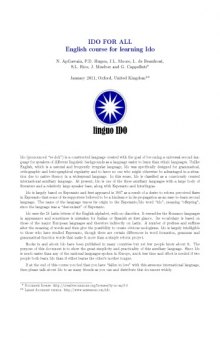 جزییات کتاب
جزییات کتاب
Ido (pronounced “ee-doh”) is a constructed language created with the goal of becoming a universal second lan guage for speakers of different linguistic backgrounds as a language easier to learn than ethnic languages. Unlike English, which is a natural and frequently irregular language, Ido was specifically designed for grammatical, orthographic and lexicographical regularity and to favor no one who might otherwise be advantaged in a situation due to native fluency in a widespread language. In this sense, Ido is classified as a consciously created international auxiliary language. At present, Ido is one of the three auxiliary languages with a large body of literature and a relatively large speaker base, along with Esperanto and Interlingua.Ido is largely based on Esperanto and first appeared in 1907 as a result of a desire to reform perceived flaws in Esperanto that some of its supporters believed to be a hindrance in its propagation as an easy-to-learn second language. The name of the language traces its origin to the Esperanto/Ido word “ido”, meaning “offspring”, since the language was a “descendant” of Esperanto.



 دانلود کتاب
دانلود کتاب

 جزییات کتاب
جزییات کتاب





 این کتاب رو مطالعه کردید؟ نظر شما چیست؟
این کتاب رو مطالعه کردید؟ نظر شما چیست؟
